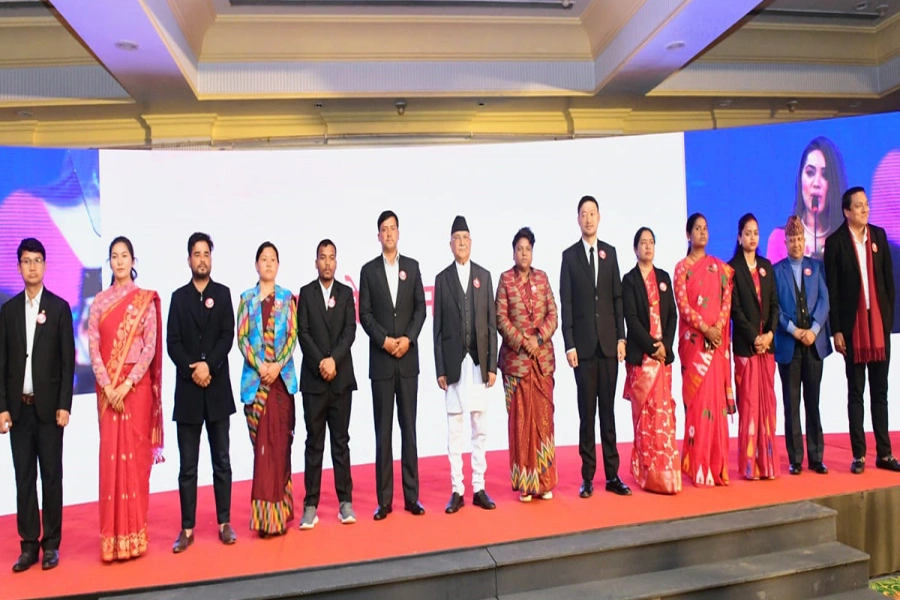KATHMANDU, June 1: The government has announced that it will change the model of agricultural subsidies keeping in view of complaints about the misuse of subsidies given in the agricultural sector.
Finance Minister Dr Prakash Sharan Mahat has changed the subsidy model through the budget for the fiscal year 2023/24 unveiled earlier this week.
Finance Minister Dr Mahat has announced that agricultural subsidies will be based on production with the slogan ‘Utpadan Sathma, Anudan Haatma’, and all other types of agricultural subsidies will be based on quality seed purchase, chemical fertilizers, insurance and mechanization.
It is said that new standards and procedures will be formulated and implemented by mid-August to make the subsidy system systematic and transparent. It is believed that real farmers will benefit and help increase agricultural production.
When there is no increase in production in the country, while billions of rupees worth of agricultural and animal products are being imported from abroad, the government has brought the budget with a high priority in the agricultural sector. Although the government has reduced the size of the budget for the fiscal year 2023/24, it has increased the budget for the agricultural sector.
Homestay not attracted by subsidy

Finance Minister Dr Mahat has increased the budget of the agriculture sector by Rs 3.5 billion for the coming year. A budget of Rs 58.98 billion has been allocated for the Ministry of Agriculture and Livestock Development for the coming year. In the current FY 2022/23, the government has allocated a budget of Rs 55.89 billion. In the budget, emphasis has been placed on increasing agricultural production.
The budget has placed emphasis on increasing the production and productivity of the agricultural sector, which is the main basis of the national economy. The budget aims to modernize and commercialize the agricultural sector, making appropriate arrangements for storage and marketing of agricultural products, and giving high priority to food and nutrition security.
The provincial and local levels have also said that they will adopt a production-based agricultural subsidy system. Under the Prime Minister Agriculture Modernization Project, it is mentioned in the budget to expand technology, mechanization, and deploy interns in 16 super zones and 177 zones. It said that programs such as learning and earning will be conducted in 660 blocks in the province and 1,053 pocket areas in the local level. For the Prime Minister Agricultural Modernization Project a project of Rs 3.22 billion has been allocated.
It has taken a policy to make the country self-sufficient in the supply of quality seeds, and to encourage the private sector in ethnic research for development of quality seeds. About Rs 400 million has been allocated to provide 50 percent of the cost through the relevant local level as a subsidy if the farmer buys quality and high-yielding seed from the producer.
The government has taken a policy to protect the seeds of traditional and natural and nutritious local food crops with the slogan ‘Raithanema Garva Garau’. Local production and trading company of Marsi paddy, Kaguno, Millet, Buckwheats, Barley, Palpa and Salyan's ginger, Mustang's potato, Coffee Beans from Gulmi and other crops from Karnali Province and other places will be promoted by branding and assisting in production and marketing as per mentioned in the budget.
The government has allocated a budget of Rs 30 billion for the subsidy of chemical fertilizers to the farmers. In the budget, a budget of Rs 470 million has been allocated to manage the graduate manpower in agriculture and animal husbandry at every local level with the slogans of technical services in farms and support in production. Finance Minister Mahat said that the budget has been allocated to provide technical services to farmers in the fields.
In order to be self-sufficient in rice and potatoes, it is mentioned in the budget to expand rice and potato cultivation in 100 local levels, to develop hybrid varieties of rice and to provide production-based subsidies to expand rice cultivation. There are programs designed to promote organic agricultural production and use it effectively.
There is a program to promote natural farming without the use of fertilizers and pesticides, and there is a program to start natural farming as a government agricultural farming model. In the budget, there is a program to encourage the transfer of the experience and knowledge of leading farmers who have done exemplary work in the fields of agriculture, fruits, vegetables, animal husbandry, etc, to those who want to start agricultural enterprises.
Krishi Gyan Kendra has a program to mobilize such farmers as agricultural extension agents by giving them the identity of Guru Kisan. To make the agricultural profession more respectable and attractive, the budget has adopted the policy of awarding the President's Best Farmer Award in coordination with the provincial government. Giving priority to the promotion of sugarcane cultivation and ethnic development, a budget of Rs 800 million has been allocated to provide expenses for the promotion of sugarcane production to farmers.
A budget of Rs 120 billion has been allocated for the operation of the youth start-up grant program in cooperation with the local level to develop entrepreneurship by attracting young manpower in agriculture and livestock business.
The small farmer enterprise development program has been gradually expanded to all local levels and a policy has been taken to motivate young manpower in the agricultural sector through financial access and entrepreneurship development. A budget of Rs 300 million has been allocated to encourage farming by land consolidation, to prepare a legal basis for contract farming, to standardize barren land across the country in coordination with the local level, and to use it for contract and collective farming.







































